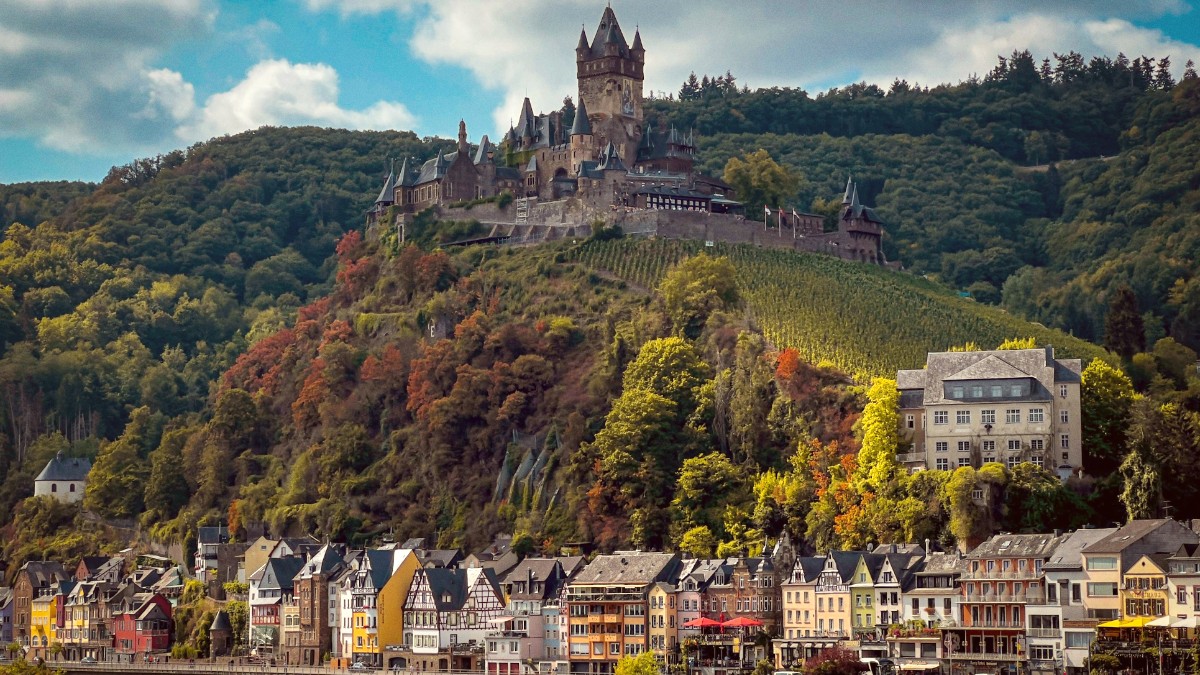
Rhineland Palatinate, Germany
The Rhine Valley experiences a temperate climate with four distinct seasons. Each season brings its own weather patterns. Spring (April-May) means mild temperatures (10-20°C), blooming landscapes, and moderate precipitation. Summer (June-August) brings warmth (20-25°C), occasional thunderstorms, and longer daylight hours.
Autumn (September-October) offers mild weather (10-18°C), less rain, and spectacular vineyard colors. Winter (November-March) is cold (0-5°C), with frequent frost and occasional snow, coating castles in white. Humidity levels are generally comfortable in spring/autumn and lower in winter.
The Rhine Valley does not experience monsoons or hurricanes. Extreme temperatures are rare but can occur. In summer, heatwaves can push temperatures above 30°C (86°F), making hydration and shade a consideration. In winter, cold snaps can bring temperatures below -5°C (23°F), necessitating warm clothing.
Always check the local forecast before and during your trip.
Peak travel, highest prices
Ideal weather, all attractions operate fully.
Larger crowds, highest prices for lodging and flights.
Good balance of weather & crowds
Pleasant weather, fewer crowds, lower prices, beautiful scenery.
Some attractions may have reduced hours, variable weather.
Budget-friendly, quiet charm
Fewest crowds, lowest prices, unique winter atmosphere.
Many attractions closed or limited, cold weather for outdoor activities.
Germany is part of the Schengen Area, a group of 27 European countries with no passport or border control at their mutual borders. Citizens from countries without a visa-waiver agreement require a Schengen visa, permitting stays up to 90 days within any 180-day period. Apply at the German embassy or consulate in your home country before your trip.
Citizens of the United States, Canada, Australia, New Zealand, the United Kingdom, Japan, South Korea, and many South American countries do not require a Schengen visa for stays up to 90 days for tourism or business. Your passport serves as your entry document. Always verify current visa requirements with the German embassy or consulate prior to departure, as rules can change.
Valid for 3 months beyond departure, issued in last 10 years, 2 blank pages.
Physical visa in passport if required.
Mandatory for visa applicants, recommended for others (min. €30,000 coverage).
Bank statements or credit card limits.
Proof of onward or return travel.
Planning your finances aids in enjoying your Rhine Valley trip without stress. Germany's official currency is the Euro (€).
ATMs (Geldautomaten) are widely available. Most hotels, larger restaurants, and shops accept major credit and debit cards (Visa, MasterCard, Maestro). Carry some cash for smaller purchases or local markets. Check current exchange rates before converting currency.
Tipping in Germany is common but not mandatory, unlike in some countries where it forms a large part of service staff wages.
These figures provide a general guide for per-night accommodation, meals, and other services.
Germany maintains high standards in these areas, and a few considerations guide travelers in preparation.
Sunburn may occur, specifically in summer and on boat trips. Drink plenty of water during warmer months or physical activity. Check for ticks after hiking in wooded or grassy areas during spring and summer.
Pollen counts can be high in spring and early summer; pack allergy medication if needed. Some boat trips might cause motion sickness; consider packing remedies.
Germany boasts a high-quality, efficient healthcare system. Hospitals and clinics are modern and well-equipped.
Dial 112 for emergency medical and fire services (Europe-wide).
For police, dial 110.
Pharmacies (Apotheke) are widely available, identified by a red 'A' or green cross. They sell over-the-counter medications and fill prescriptions. Pharmacists offer advice on minor ailments.
Most doctors, especially in larger towns, speak English. Your hotel helps locate a local doctor.
Ensure routine vaccinations are current. No mandatory vaccinations are set for general tourism.
Tap water is safe to drink throughout the Rhine Valley and all of Germany. It undergoes strict quality controls. Food hygiene standards are very high, making foodborne illnesses rare.
Refill your reusable bottle from any tap. Enjoy local cuisine with confidence.
Minimal natural disaster risks. Major destructive floods are rare.
| Category | Information | Recommendation |
|---|---|---|
| Crime | Rhine Valley is very safe. Main concern is pickpocketing in crowded areas. | Keep valuables secure. A Money belt or Anti-theft bag helps. |
| Natural Disasters | Minimal risks. River can have high water levels; heatwaves in summer. | Follow local advice for staying cool. Exercise caution on icy roads in winter. |
| Travel Insurance | Highly recommended for all visitors. Covers medical emergencies, trip interruptions. | Seek a policy with sufficient coverage. Keep 24/7 assistance number handy. World Nomads, SafetyWing, Insubuy are options. |